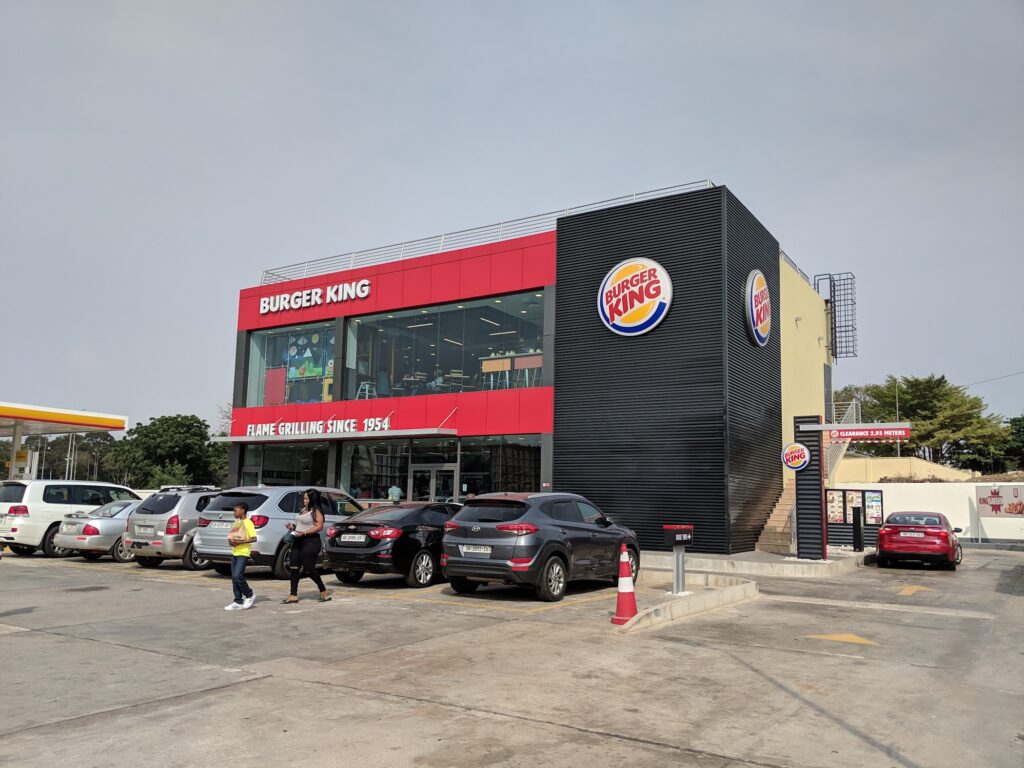In Accra, you are likely to encounter an assortment of billboard advertisements promoting the latest meals from fast food brands.
These brands offer consumers delicacies including burgers, pizzas, and milkshakes.
International brands like Burger King, a popular American food eatery that debuted in 2018, are steadily expanding.
They currently have two branches in Accra, with a third branch recently opening up in the popular neighbourhood of Labone.
The growth trend of fast food has also spurred the growth of mobile food delivery applications. These applications enable customers to select food items from their favorite food spots, make online payments, and deliver them to their location, all through a smartphone.
However, the emergence of fast food in Ghana may be contributing to a negative side effect: helping to increase obesity rates.
According to data from the World Health Organisation (WHO), obesity rates of adults in Ghana have more than quadrupled since 1975 to 2016.
Rates have risen from a modest 2% in the 1970s to about 10% in 2016. Recent figures show that rates have risen to about 43%.
Obesity, by definition, is a medical condition characterized by excessive body fat accumulation. It is typically measured using the Body Mass Index (BMI), a screening tool that assesses whether a person is underweight, normal weight, overweight, or obese.
A BMI of 30 or higher is classified as obese. The higher an individual’s obesity level, the higher the risk for future health issues.
There is substantial evidence to show that fast food contributes to an increase in obesity.
So as food brands open new branches across cities like Accra and Kumasi, should more effort be applied to slow consumption and offer better alternatives?
Or will obesity rates rise to a critical level before drastic action is taken?
The Rise of Fast Food in Ghana

Local eateries or “chop bars” as they are more popularly known, have always offered meals like fufu to satisfy Ghanaians who eat out. Street vendors who sell waakye and other local meals are still the go-to for most when purchasing food on the go.
But as cities like Accra become more urbanised, fast food eateries like Eddy’s Pizza and Kentuck Fried Chicken (KFC), a fast food chicken establishment, are becoming more popular with the youth and young adults.
There are more than a dozen fast-food brands currently in operation in Accra. Most operate in affluent areas like Cantonments, East Legon, Airport, and Labone.
According to the Ghana Statistical Service, a study of 3,380 Ghanaians published in 2022, revealed that more than 50% were obese
But lately, they have increased their footprint in less affluent areas like Haatso and Dansoman.
What is contributing to the popularity and growth of fast food in Ghana? According to the head of a food delivery startup, convenience and variety are major factors.
“People are looking for convenience in their busy lifestyles,” said Anthony Owusu-Ansah, CEO of Shaq Express, a startup that takes online orders and delivers them through a mobile application.
“It’s also becoming more about variety, with both local and international options now more accessible. It’s not surprising that we find the orders for fast food increasing exponentially”, he added.
But as fast foods become more popular, its effects on health are becoming more prevalent.
Fast Food and Health Complications
Research shows that fast foods, which have high fat saturation and large calorie composition, contribute to increases in obesity rates.
According to the Ghana Statistical Service, a study of 3,380 Ghanaians published in 2022, revealed that more than 50% were obese. In that same study, 86% of respondents stated that their eating habits were “unhealthy”.
These eating habits can lead to health complications, including diabetes, hypertension, and heart disease.
In a published report from Ghana’s Birth and Death Department, hypertension was one of the leading causes of death in 2022. Heart failure and diabetes were also on the list.
Andrew Annan, a pharmacist with experience in health policy, preventive and public health, says the increase in marketing of fast food and its widespread availability helps to contribute to rising obesity rates.
“The thing with fast food is that they don’t actually satisfy you for long periods due to how processed they are,” he said.
“They are stripped of fibre and other nutrients- causing you to eat more, or they are high in calories to satisfy but low in nutrients for the body.”
What Can Be Done To Slow Consumption?
With health complications attributed to increased consumption of fast foods, can anything be done to curb the trend in Ghana?
Mr. Annan wants more emphasis on education, especially in primary schools.
“Our education system teaches about balanced meals but does not practice it – a situation typically blamed on lack of resources,” he stated.
“However, maximising our local foods when in season and teaching how to eat and the benefits of our food as well as the consequences of fast food culture will yield significant value.”
“While people love fast food, there has been a growing interest in healthy lifestyles and healthier meal options,”
Anthony Owusu-Ansah, the CEO of Shaq Express
When asked if a ban on fast foods might help, he replied in the negative but suggested another alternative.
“I think increasing the cost of fast food is an effective way to combat it,” he said. “
But it should be done with massive education on alternative options to each fast food option with ready availability. For example, we can increase taxes on carbonated beverages and encourage local production of sobolo, brukina, coconut water, teas, and coffees.”
The Government has made some effort on this front.
An Excise bill, which was passed by parliament in 2023, placed a 20% tax on sugary drinks. This tax was passed on to consumers, resulting in higher prices of carbonated drinks like Coca-Cola and Sprite.
But whether this bill produces the desired result of forcing consumers to opt for healthier alternatives remains to be seen.
Anthony Owusu-Ansah, the CEO of Shaq Express, stated that food delivery apps could do more to promote healthier food options.
“While people love fast food, there has been a growing interest in healthy lifestyles and healthier meal options,” he said.
“Offering more balanced choices, like salads or smoothies and even grocery deliveries for vegetables and fruits, like ShaQ App does, would help cater to those looking for something lighter or more nutritious.”

Fast Food Culture is Here to Stay
As of January 2025, Pizzaman Chickenman, a very popular pizza and chicken fast-food joint, has opened 90 branches nationwide, growing faster than most of the international food brands.
With these brands increasingly opening more locations, a slowdown in consumption might not happen anytime soon.
With obesity rates steadily rising, a concerted effort to promote healthier eating is needed.
Mr Annan, the health nutritionist, stated that one of the best ways to curb consumption is to target how fast food is advertised.
He also advocated for more transparency on what food items contain.
“People need to know what they’re eating. In the US, fast food chains are mandated to publish the number of calories in each meal,” he said. “Labelling must be clear and not deceptive.”
At the moment, fast food brands in Ghana have no incentive and are not mandated to emulate the publication of calories similar to their US counterparts.
As the country becomes more urbanised, food brands will continue to increase their footprint to entice and serve more customers.
But with data showing an uptick in obesity and the health complications that come with it, the battle to curtail or slow fast food consumption might become a lost cause unless necessary action is taken.





